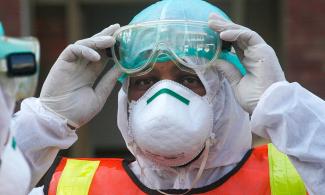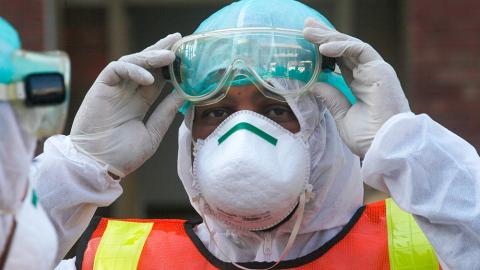
The organisation’s analysis revealed that more than 3000 health workers are known to have died from COVID-19 worldwide, a figure it said was likely to be a significant underestimate.
Governments must be held accountable for the deaths of health and essential workers, who they have failed to protect from COVID-19, Amnesty International said on Monday in its new report documenting the experiences of health workers around the world.
The organisation’s analysis revealed that more than 3000 health workers are known to have died from COVID-19 worldwide, a figure it said was likely to be a significant underestimate.
According to report, the countries with the highest numbers of health worker deaths thus far are Russia (545), United Kingdom (540, including 262 social care workers), United States (507), Brazil (351), Mexico (248), Italy (188), Egypt (111), Iran (91), Ecuador (82) and Spain (63).
It also documented cases where health workers, who raise safety concerns in the context of the COVID-19 response, have faced retaliation ranging from arrest and detention to threats and dismissal.

“With the COVID-19 pandemic still accelerating around the world, we are urging governments to start taking health and essential workers’ lives seriously.
“Countries yet to see the worst of the pandemic must not repeat the mistakes of governments whose failure to protect workers’ rights has had devastating consequences,” said Sanhita Ambast, Amnesty International’s Researcher and Advisor on Economic, Social and Cultural Rights.
“It is especially disturbing to see that some governments are punishing workers who voice their concerns about working conditions that may threaten their lives. Health workers on the frontline are the first to know if government policy is not working, and authorities who silence them cannot seriously claim to be prioritising public health,” Ambast added.
Health workers also reported serious shortages of personal protective equipment in nearly all of the 63 countries and territories surveyed by Amnesty International.
This includes countries, which may yet see the worst of the pandemic such as India and Brazil and several countries across Africa.
In Egypt, for example, Amnesty documented the cases of nine health care workers, who were arbitrarily detained between March and June on vague and overly broad charges of "spreading false news" and "terrorism".
All those detained had expressed safety concerns or criticised the government’s handling of the pandemic.
Another Egyptian doctor told Amnesty International that doctors who speak out are subjected to threats, interrogations by the National Security Agency, administrative questioning, and penalties.
He said, “Many (doctors) are preferring to pay for their own personal equipment to avoid this exhausting back and forth. (The authorities) are forcing doctors to choose between death and jail.”
In some cases, strike action and protests have been met with heavy-handed responses.
In Malaysia for example, police dispersed a peaceful protest against a hospital cleaning services company.
The protesters’ complaints centred on what they said was the unfair treatment of union members by the company as well as a lack of sufficient protection for hospital cleaners.
Police arrested, detained and charged five health care workers who were protesting for “unauthorised gathering” in violation of their rights to freedom of association and assembly.
“Health and essential workers have a right to raise their voices against unfair treatment,” said Ambast.